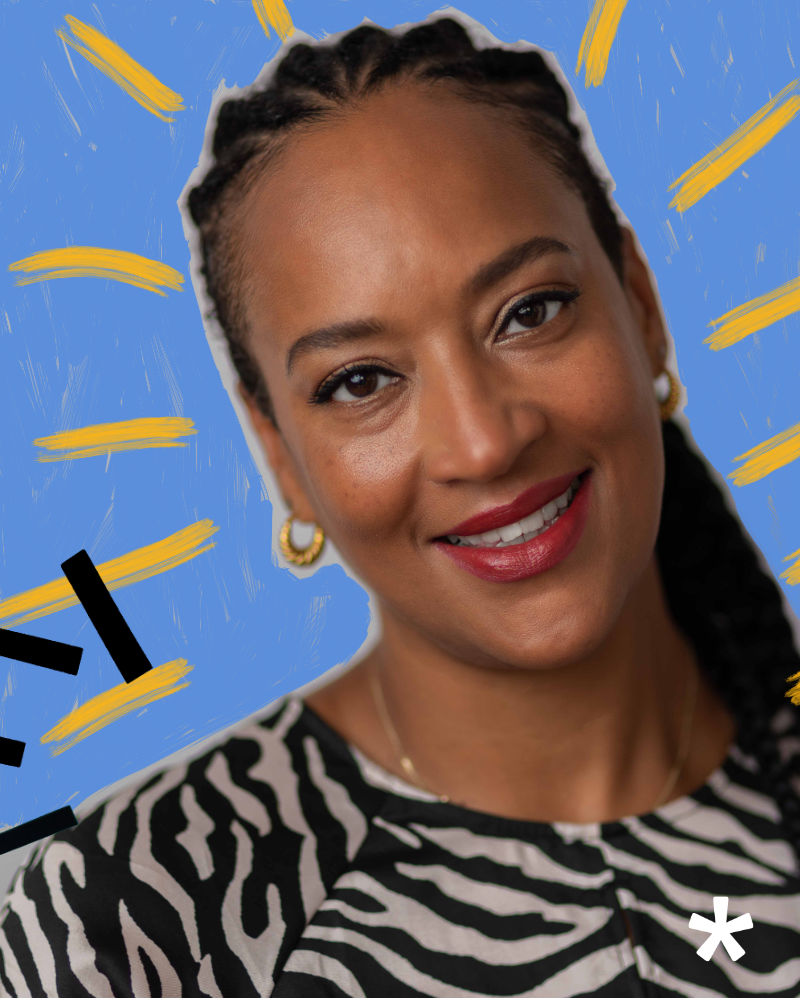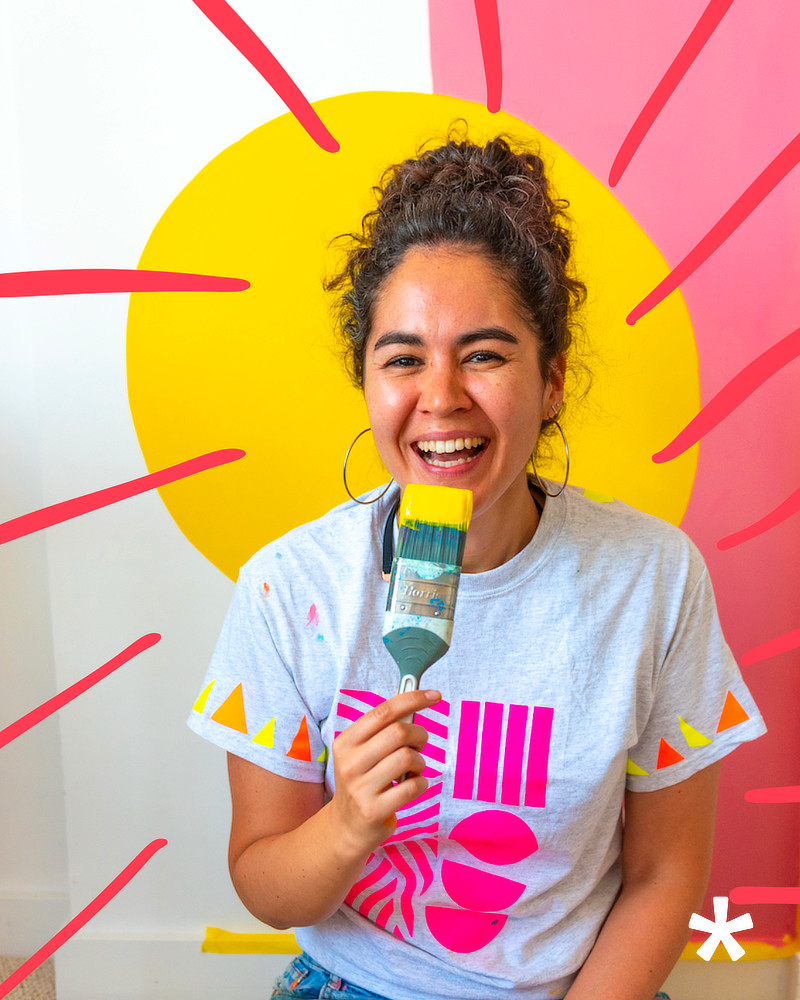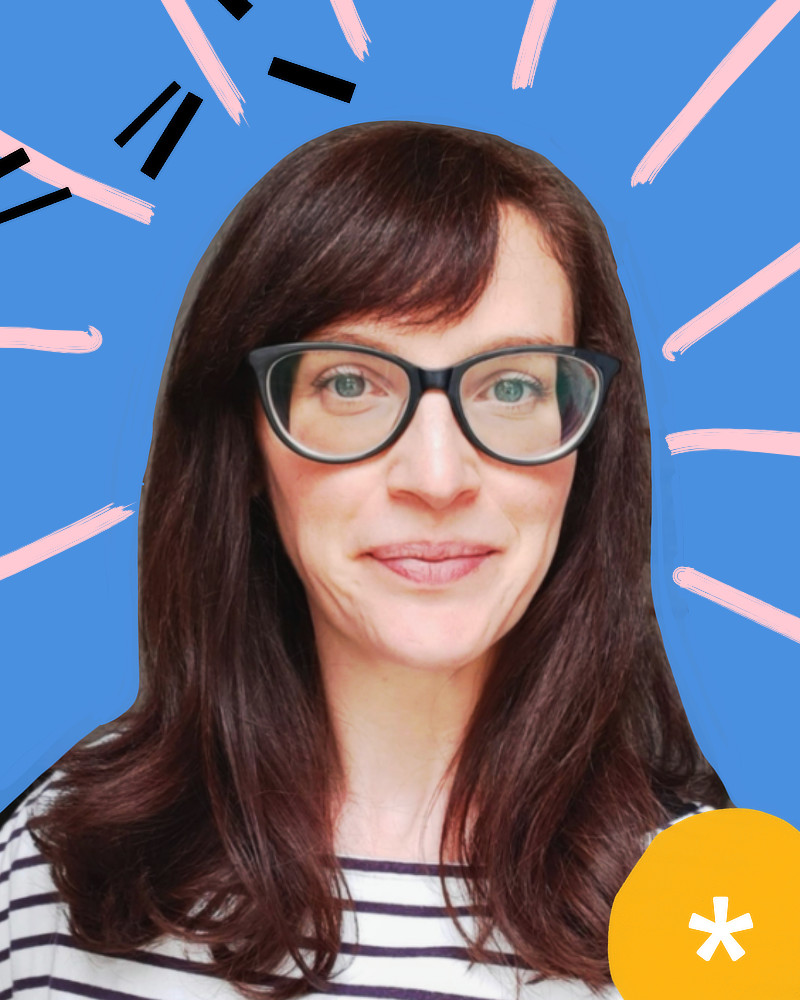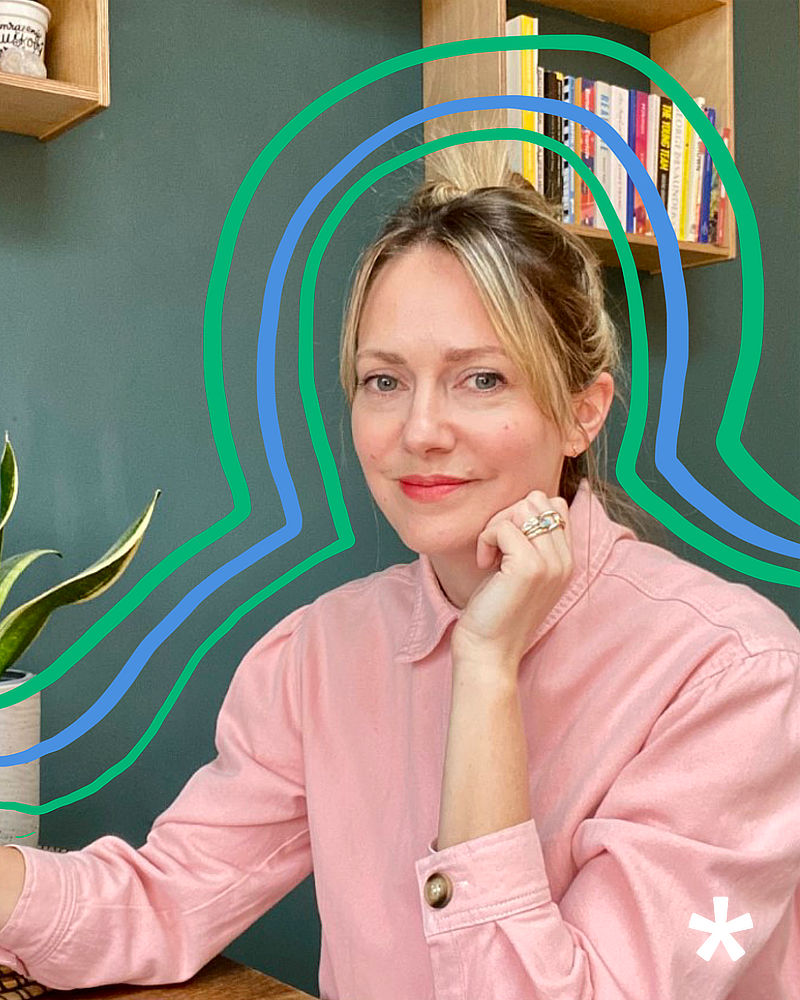Johanne Penney is a force for change. A disruptor, facilitator, speaker, mentor and writer, Johanne is the founder of Amp Up Your Voice. A passionate anti-racist advocate she works with decision makers and leaders to drive long term change in creating equal, diverse and inclusive businesses. Johanne spoke to me openly about her experience of racism, her journey into writing and ways we can all create the foundations for equitable, inclusionary businesses.
“It’s often disbelief when you experience racism as a Black or Ethnically diverse person. I recognised, through that experience, that there is a distinct lack of safe space, support or progression for Black women, particularly in business.”
Can you tell me a little about your background?
I’m not sure I can sum it up in a few words as there is so much that’s come before this time in my life but I grew up in Maidenhead and Windsor, which as you can imagine was hard as a Black girl, come woman, in a notoriously elite white world. I was born into a very strict religion and was conditioned to stay in it until I was a teenager. But I left it behind as soon as I practically could and came to London when I was 20. I would literally say hello to every Black person I met or who passed me in the street. That quickly came to an end when I realised the demographic was completely different here.
It was against my parents’ religious beliefs for me to go to University, so I have always worked since the age of 16. Up to that age I had been well educated so found it relatively easy to find work, and started as an office junior and worked my way up. But aged 20, I found out I was pregnant. I married the person and it kinda set the direction for my life for a while. I had my second child aged 23, and left the marriage, considering what I could do to set the standard for the rest of my career. Despite being a single mother, with two tiny children, a messy divorce and no family nearby, I started and graduated from a law degree at Westminster University. It was also where I met one of my closest friends, Ellie. She introduced me to her group of amazing women and we still are each other’s tribe now. My support, my sisters. After that my career went from strength to strength and I worked across a range of professional organisations, always championing anti-racism.
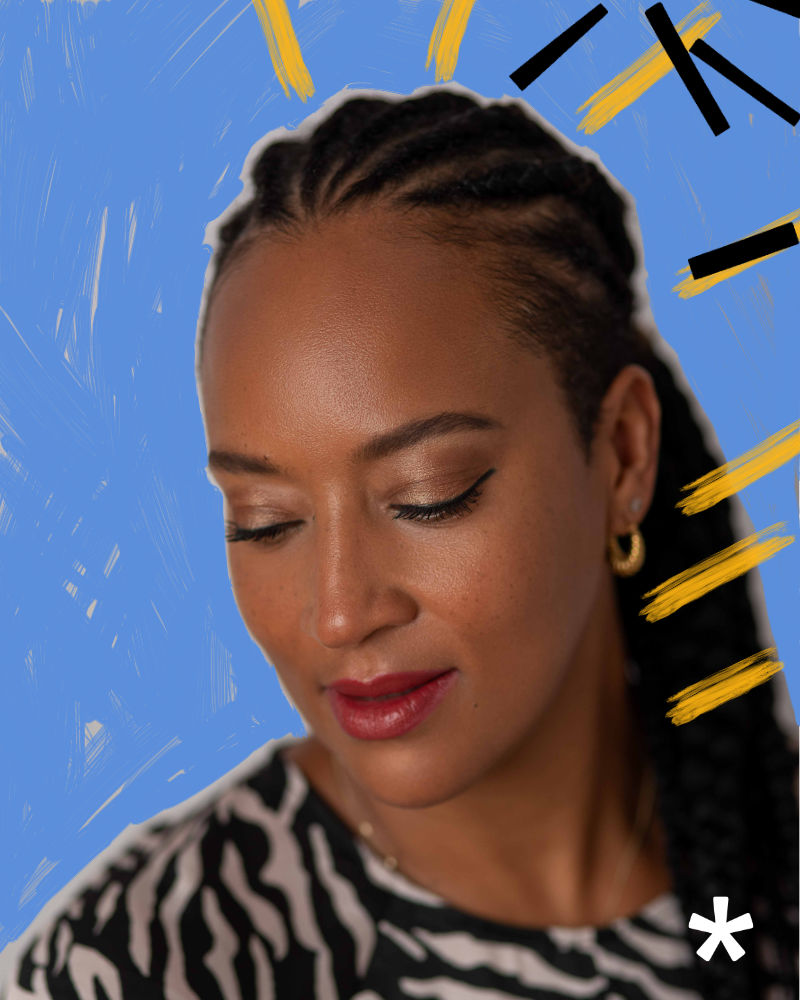
What was the moment that made you realise you needed to start Amp Up Your Voice?
I’d had a horrible experience that completely blindsided me as a Black woman. I was like ‘whoah’ did that just happen. It’s often disbelief when you experience racism as a Black or Ethnically diverse person. I recognised, through that experience, that there is a distinct lack of safe space, support or progression for Black women, particularly in business. We know statistically that we face disproportionate levels of inequity. Sexism meets racism and POW, there’s the intersectionality. I wanted to create something that provided for and filled a gap which is so desperately needed and I built Amp Up Your Voice, initially to support Black women. However, AMP has continued to evolve and build from the original concept to become an anti-racism consultancy, becoming a champion and making space for all marginalised individuals and groups. I work mostly at a corporate level, training and educating businesses across the UK and Internationally, making sure that Black and Ethnically diverse people are involved at the executive level and in decision making.
“It is time to amplify the voices of those who have not been heard as loudly as they need to be so far.”
Did you find it difficult coming up with a name for your brand, or did you just know?
I worked with business coach Jo Valentina Sinclair and we came up with it quite easily! The name came out of our conversations, talking about the purpose of AMP and how it originated. It is time to amplify the voices of those who have not been heard as loudly as they need to be so far. I’m so proud of it and clients comment on how much they love it and what it stands for.
When we last caught up we talked quite honestly about white privilege, racism, sexism, class, motherhood, and your experience of being a Black woman in Britain. Your brand is about empowering but also identifying racism and exclusionary practices in the workplace. Even if you’re a tiny business just starting out, what are the things we can all do to make sure our businesses are equitable and inclusionary?
Times have changed and are changing. But we still have a really long way to go in terms of really having a society that values everyone, and that has nothing to do with the colour of skin, what gender you are, and your social status. We really do have a long way to go in terms of equity. We all need to develop a comprehensive understanding of what it means to be truly diverse, and if we’re hiring think about whether the people we’re hiring ‘are reflective of a multicultural society?’ Then we need to factor in how to be inclusive, asking ‘how do we foster an environment when everyone can be their true authentic selves at work’? Productivity, and profits, are directly affected by how happy the people who work for you are. If they have to conform or fit into certain ideals or cultures that are a result of years and years of systemic barriers or discrimination then this is highly unlikely.
So really it’s a huge educational piece which will help you recognise your own biases or stereotypes that you may or may not be aware of. That really is the first step. After that it’s about thinking about what you can do as a business, within your remit, power and influence and making those tangible changes. Essentially it requires an individual and collective piece of reflective thinking, and there are a plethora of ways you can be an ally and advocate. With AMP I provide expert help and opinion to businesses, and a space to talk honestly and openly without it being a blame game.
How have you found the period since the Black Lives Matters protest? Have you noticed a real change in behaviour in workplaces?
I always say it’s a movement not a moment, a mantra that is used globally and it’s true. What happened after George Floyd was murdered during that exposed police brutality tragedy, is a mass movement for equity and it projected BLM into the mass media in a way we have never seen before. I called 2020 a global awareness period and for businesses this really was peak awareness. They suddenly became aware of issues that Black and Ethnically diverse individuals have been experiencing for a long time. 2022 should be a call to action in the workplace and it cannot be performative. Companies need to be asking what they are actually going to do about it. It’s about businesses taking on that accountability, with measurable and tangible outcomes and impact to really ensure authentic equity. If there has ever been a time in my life and in the lives of other Black people, where we have an opportunity in a way that we have never had before, to ensure our voices are genuinely heard, this is it. People are listening for once. We cannot afford to let that slip by unvoiced and unheard.
You also do one to one coaching to empower other people to drive change in their organisations. What’s your advice for someone who has recognised that their workplace policies and culture are not inclusive?
The onus is not and should never be on one person. A lone person should not have the sole responsibility to solve the systemic racism and barriers within their organisation. But often it is left to a minority of people. I strongly believe in a top down approach with responsibility and accountability being driven by organisations leadership teams. They set the tone for their business and should be role modelling the behaviour and culture that they want for their organisation. I often see that the onus is put upon those who are already discriminated against to deconstruct the system, to make the shifts. But this is not OK. They are already exhausted and possibly traumatised if the culture is not inclusive. Businesses need to do better and if they don’t know how to do it they must employ those with lived experience and expertise on how to navigate the often uncomfortable conversations and how to make impactful change.
“Writing is a cathartic way for me to articulate how I feel about a lot of disparity in society.”
You’re also a writer for Millennial Femme. How did this come about?
I kinda always knew I could write in a formal way from my law degree and working in policy, but I didn’t ‘know know’ that I could write from the heart. Anyway, it was during Covid and I was on social media in a way that I hadn’t been before. Looking, reading, soaking up what was out there and I saw Krissy Isabelle, the founder of Millennial Femme, advertise for a writer. I can’t remember what genre I applied for but she curved-balled me and said,“I think you should write our Dating and Relationships column”. So I accepted, went full throttle and became an agony aunt. Not long after she asked me to become the cultural writer. It took off from there and I haven’t looked back. Writing is a cathartic way for me to articulate how I feel about a lot of disparity in society. It crosses between sometimes uncomfortable conversations on race, existing barriers and society but it also is a ‘feel good’ space where I write about amazing people who are trailblazing and navigating positive change.
What do you like most about working for yourself?
I probably work harder than I have for any place I’ve been employed, but I manage it in my own time. I disliked having to conform to the 9-5 culture. I just don’t buy into it as I don’t believe it gets the best out of people. I love that I am getting the best out of myself, my plan, my future whilst helping in a societal way. And I get to work when I want. I start work later than most, 10 or 11am, but I also work late into the night sometimes. This works for me.
Who or what inspires you?
Maya Angelou. She spoke about the adversity Black women are dealt in society, and talked about intersectionality long before the term was coined. Much of her life was about adversity and how to overcome it but yet she was the most positive, forward thinking woman of her time. She is someone to admire and aspire to. I have ‘Still I rise’ from her famous poem tattooed on my arm. Someone left that poem on my keyboard at work, without saying a word, when I was going through my bad experience at work. I will never forget the relief I felt that someone understood exactly what was happening, and who was also by my side as a true ally.
A huge part of starting and growing a business is having the right mindset. What are some of the things you do to stay motivated?
I genuinely love people and I talk to everyone. I canvass opinion, I debate, but I also know my own mind. I continually educate myself in a way that I didn’t have space to before. By having an open mind, you are in a continual growth mindset, and AMP is a constantly evolving space where nothing is static. I have to keep acquiring knowledge. I am also very kind to myself. I eat well, exercise, travel, dance and socialise a lot!
What’s your advice for someone who has an idea for a business but hasn’t yet started?
Get a mentor who knows how to navigate a start up. Someone who can share the knowledge with you, it’s totally worth the investment. Also don’t share too much, or your ideas until you really know how you will pursue it. It’s sometimes easy to become clouded by other people’s opinions and on whether it will or will not work. Just do you. If you believe in it you should go for it. For my business I was able to use my existing skill set and knowledge to propel me forward. For instance it would have taken me a lifetime to become a pilot or a Michelin starred chef, although not impossible, but instead I used what I had in my locker with something I was passionate about to progress. I was able to use my corporate and public sector experience to propel AMP off the ground.
I feel that failures can be even more important than our successes, and are necessary for our growth. Can you tell me about a failure, and what you learnt from it?
We are all on a journey and you will inevitably stumble or fall at some point, whether that is professionally or personally. So it’s about how you get up, move and learn from each of those events. If you are able to use it as a learning curve, it can really contribute to your success and you can teach others who are coming up the ladder behind you. However, it’s quite subjective as to what a person sees as failure. I try to think positively for every experience and not see it as a failure per se. But I have made many missteps over a long period of time, for example jumping into a job or position that wasn’t right for me because I was desperate to move on. I might mope for a bit but I try to have that reflective piece on what happened, what I could have changed or potentially done better and try not to dwell on it too much and focus on what I will do in the future. But I’m a Pisces so that can be quite hard.
What’s next for you?
I have lots of exciting projects in the pipeline including some filming work, speaker events and collaborating with partners in lots of different sectors. I’m really proud to be continuing working with some key businesses who are building and implementing a long term strategy for change. They know the tick box approach to training is outdated and are embarking on a journey with longevity, impact and authenticity in mind! I’m really interested in working more in the creative industry and with women entrepreneurs, using my skill and expertise to propel their business and embed diversity, equity and inclusion as ‘business as usual’. I also feel like there is something else great that is going to happen. All my senses are standing to attention, saying there is something you haven’t done yet which is going to make a big impact. I just don’t know what it is yet. But whatever it is, I am here for it. As long as making a difference is at the heart of it, I’m all in!


